Featuring an array of transformative narratives, 'Revolution in the Bible' unveils a new perspective on popular biblical stories.
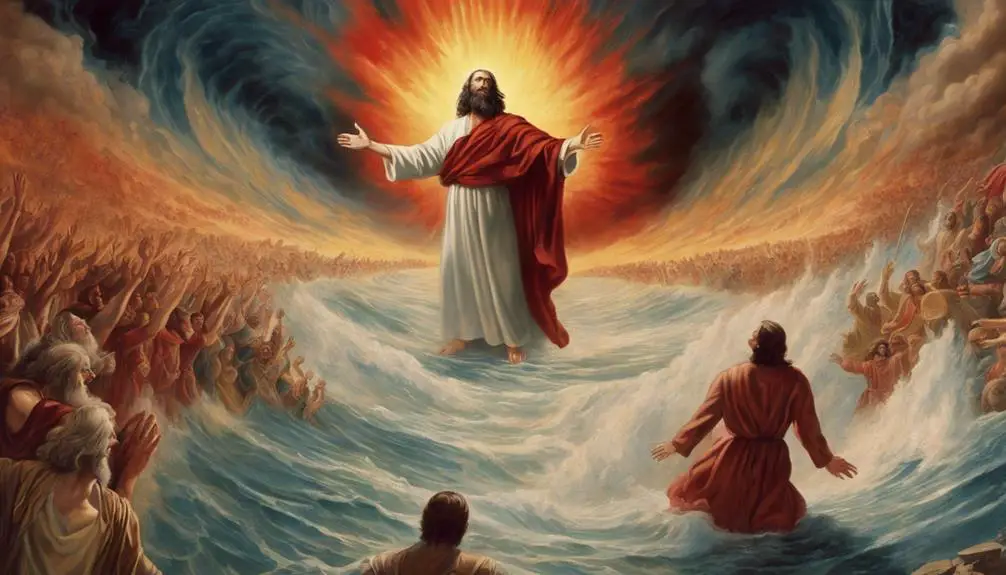
Revolution in the Bible
Take a moment to consider the Exodus, often seen as the first significant revolution documented in the Bible. It's a narrative about an enslaved group's fight for freedom and self-determination, a theme that echoes throughout the religious text.
Yet, isn't it fascinating how the term 'revolution' isn't directly associated with the Bible? This leaves us to ponder: can we view the Bible as a chronicle of revolutions, and if so, how does this perspective change our understanding of these sacred scriptures?
Key Takeaways
- The Bible chronicles numerous revolutions, including Exodus led by Moses which challenged Egyptian oppression.
- Prophetic figures like Isaiah, Jeremiah, and Nathan played crucial roles in political upheaval and advocating for change.
- Jesus' revolutionary teachings, such as the Sermon on the Mount, emphasized justice, love, and humility, challenging societal norms.
- Paul's letters and outreach to Gentiles significantly influenced early Christianity, while the book of Revelation presents a vision of radical change.
Exodus: The First Biblical Revolution
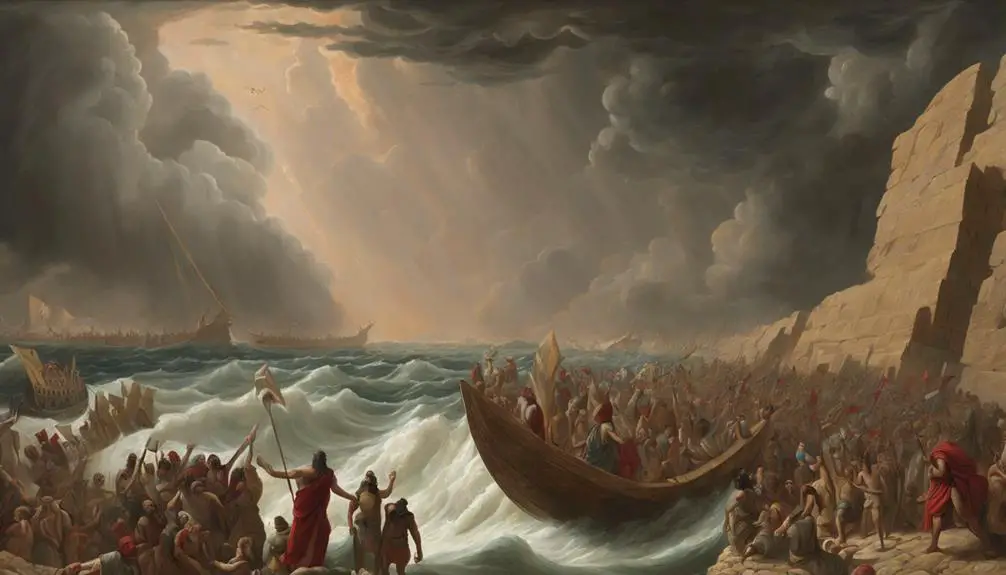
In analyzing the biblical narrative of Exodus, you'll uncover the first major revolution in the Bible, a seismic shift that forever altered the course of religious history. At the core of this revolution was Moses' leadership, which was pivotal in challenging and dismantling the Egyptian oppression.
As you delve deeper, you'll find that Moses' leadership was characterized by courage, resilience, and faith. He wasn't merely a religious figure but also a political leader who rallied the Israelites against their oppressors. His transformative influence wasn't incidental or happenstance, but a deliberate and concerted effort to liberate his people from the chains of Egyptian oppression.
The Egyptian oppression, in contrast, was brutal, inhumane, and relentless. The Pharaohs enslaved the Israelites, exploiting their labor and suppressing their identity. This harsh reality of life under the Egyptian rule was what necessitated the revolution, giving birth to an unprecedented movement for freedom and self-determination.
Thus, the Exodus narrative isn't just a religious story but a tale of revolution, characterized by Moses' leadership and the struggle against Egyptian oppression. This revolutionary tale set a precedent, laying the foundation for future socio-religious movements in the biblical narrative.
Prophets and Political Upheaval
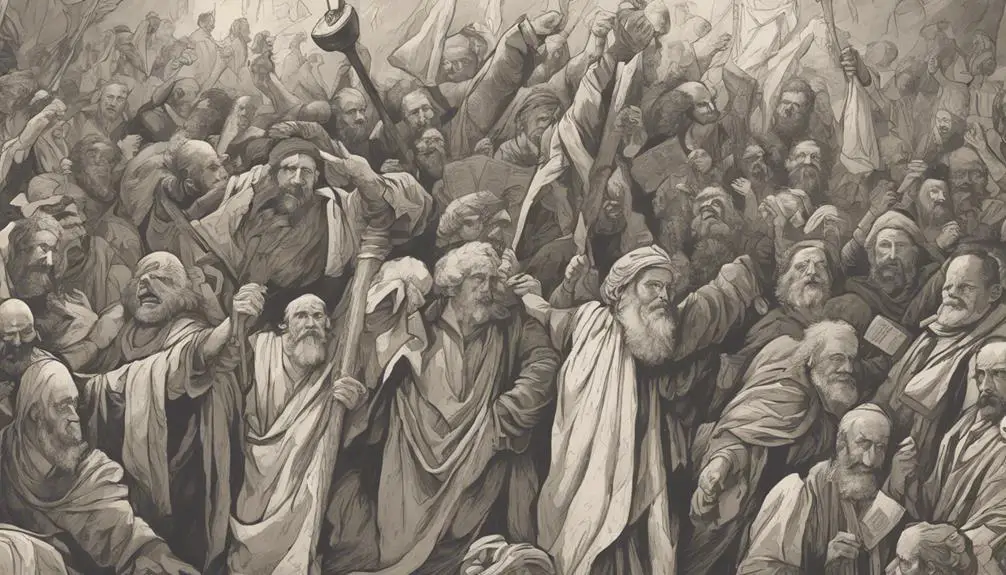
Building on the precedent set by Moses, the role of prophets in the Bible further underscores the revolutionary spirit, particularly in times of political upheaval. You'll notice how prophetic activism often emerged amidst socio-political crises as a form of divine intervention, challenging established orders and promoting social justice.
Take Isaiah, for instance. His political predictions weren't merely speculative. Instead, they were profound declarations of upcoming changes, destined to disrupt the status quo. He advocated for the oppressed, a revolutionary act in a time when social hierarchies were stringent and unyielding.
Similarly, Jeremiah's prophecies were a form of radical dissent against corrupt leadership. His messages, though unwelcome, were a necessary thorn in the side of the ruling elite, pushing for reform and justice.
You'll also observe the prophet Nathan, whose confrontation with King David was an act of bold defiance against royal misconduct. His fearless truth-telling set a precedent for holding leaders accountable, a concept revolutionary for its time.
In essence, the prophetic activism in the Bible is a testament to the revolutionary role prophets played. They weren't just spiritual guides but also political disruptors, challenging systems and advocating for change.
Jesus: Revolutionary Teachings

Often, when you delve into the teachings of Jesus, you'll find they possess a revolutionary edge that challenged the religious and social norms of his time. Consider the Sermon on the Mount, a paradigm shift in ethical instruction. The Beatitudes, in particular, overturned conventional wisdom, positioning the meek, the mournful, and the persecuted as the blessed ones. This was a radical departure from the prevailing societal values of power, wealth, and status.
Jesus' parables, too, were revolutionary, not merely instructive stories, but tools for societal critique. They subverted established hierarchies and challenged the self-righteousness of religious leaders. The Parable of the Good Samaritan, for instance, portrayed a despised outsider as the embodiment of neighborly love, thus dismantling ethnic prejudice and religious elitism.
Jesus' teachings, with their inherent call for justice, love, and humility, were revolutionary in their time and continue to challenge us today. They force us to question our own norms, confront our prejudices, and reconsider our values. This is the enduring impact of the revolutionary teachings of Jesus, and their profound influence on people's lives can't be overstated.
Paul's Influence on Early Christianity
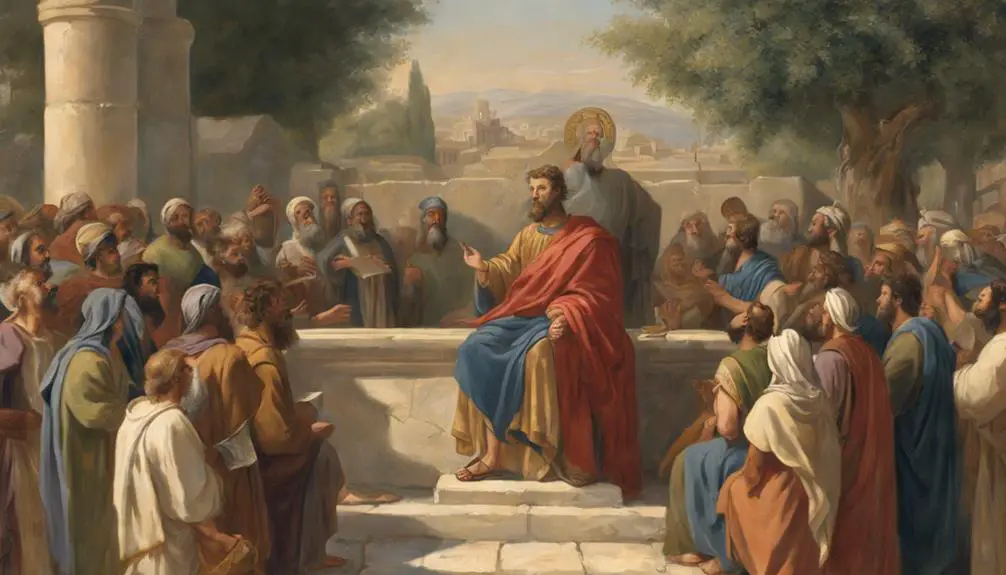
While the teachings of Jesus certainly shook the foundations of societal norms, it's equally important to examine how Paul's letters helped shape early Christianity, providing a theological framework that would deeply impact its evolution. You must understand that after Paul's Conversion, he became a significant figure, whose influence can't be underestimated.
His personal transformation, from persecutor of Christians to becoming an apostle, marked a radical shift. His writings, primarily in the form of letters or epistles, addressed to various Christian communities, provided guidance and instruction. They were instrumental in defining key theological concepts such as faith, grace, and redemption.
Moreover, Paul's Gentile Outreach was imperative to the expansion of Christianity beyond its Jewish roots. His missions across the Roman Empire, his tireless efforts to include non-Jews, broke ethnic and cultural barriers, democratizing faith in a way that was revolutionary. He preached a universal message of salvation, accessible to all, regardless of their background.
Revelation: A Vision of Radical Change

In studying Revelation, you're confronted with a vivid vision of radical change, a cataclysmic upheaval that challenges conventional understandings of power, authority, and the divine order. This apocalyptic book of the Bible offers a radical transformation, presenting a vision of a new heaven and a new earth.
The vision interpretation of Revelation requires deep analytical skills. It's not a straightforward narrative. Rather, it's a complex collection of symbolism, metaphor, and allegorical imagery.
Imagery |
Interpretation |
Effect |
|---|---|---|
The Beast |
Represents oppressive political power |
Symbolizes tyranny, challenge to divine authority |
The Lamb |
Symbolizes Jesus Christ |
Represents sacrifice, salvation, divine authority |
The New Jerusalem |
Symbolizes a new order, God's kingdom |
Represents hope, transformation, divine rule |
After interpreting these symbolic images, you understand the radical transformation Revelation envisions – a world where oppressive political systems are overthrown, and a new divine order is established. This vision of radical change isn't meant to incite fear, but to offer hope for a renewed world. Revelation, therefore, is a revolutionary text, challenging the status quo and envisioning a radically transformed future.
Frequently Asked Questions
How Did the Concept of Revolution Evolve in the Different Books of the Bible?
You're delving into how the idea of revolution shifted throughout various biblical texts. It's fascinating to see how revolutionary prophets challenged the status quo, sparking biblical uprisings.
These instances show a clear evolution of the concept, highlighting a transition from passive acceptance of divine will to active struggle for justice and change. They're significant markers of the dynamic nature of faith and morality in these sacred texts.
What Are Some Examples of Non-Violent Revolutions in the Bible?
You're seeking non-violent upheavals in the Bible, often termed as 'Peaceful Protests in Scripture'.
One key example is the story of Esther, who non-violently overturned a royal decree against her people.
Another is Daniel, whose refusal to stop praying to his God resulted in a change of law.
These Biblical Uprisings illustrate that peaceful yet powerful resistance can lead to significant societal transformations.
In What Ways Did the Bible Influence Later Religious and Political Revolutions?
You're looking at how the Bible influenced later religious and political revolutions. Biblical revolutions' impact is profound.
It's seen in how later movements interpreted scriptural uprisings to justify their causes. They used biblical narratives as a blueprint, leveraging the moral authority of these stories.
This has shaped the trajectory of countless revolutions, making the Bible not just a religious text, but a significant political tool.
How Did the Concept of Revolution in the Bible Influence Early Christian Communities?
You're looking at how early Christian communities were influenced by the idea of revolution.
The concept of revolutionary leadership, drawn from biblical interpretations, deeply affected them. Leaders, inspired by biblical revolutionaries, guided their followers towards spiritual and societal transformation.
They sought to emulate these biblical models, striving for change in their communities.
This influence fostered a collective mindset of revolution, setting foundations for the profound transformations the early Christian communities underwent.
Are There Any Opposing Views or Debates Among Theologians on the Topic of Revolution in the Bible?
Yes, there are opposing views among theologians concerning revolutionary prophets and their role in biblical interpretation debates. Some see them as catalysts for change, challenging the status quo based on divine revelation.
Others argue their actions weren't revolutionary but reformist, seeking to realign society with God's will. These debates deeply influence theological perspectives and interpretations of biblical texts.
You should delve deeper to understand these complex discussions.
Conclusion
You've journeyed through biblical revolutions, from the Exodus to prophetic political upheavals.
You've grappled with Jesus' revolutionary teachings and Paul's significant influence on early Christianity.
Finally, you've unraveled Revelation's radical vision of change.
Now, you're more enlightened about how the Bible, far from being static, pulses with revolutionary acts and teachings.
As you continue exploring, remember this dynamic aspect of biblical narratives.
It's a testament to its enduring relevance.

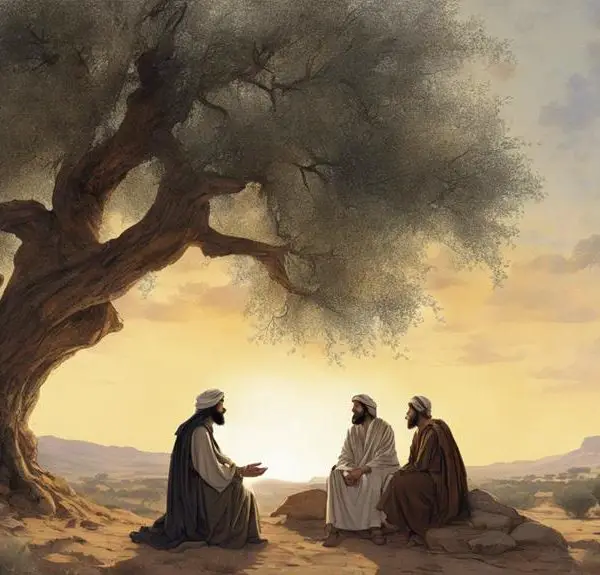

Sign up